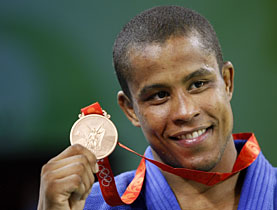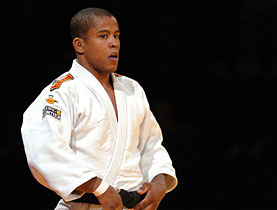Aschwanden wins Switzerland’s third bronze

Swiss judo competitor Sergei Aschwanden has taken the bronze medal in the finals of the men's 90kg category at the Olympic Games in Beijing.
Aschwanden managed to win four of five bouts he fought on Wednesday to secure his medal.
The Swiss mounted an effective counter-attack to beat Russia’s Ivan Pershin, twisting him around his waist for the decisive move known as ippon.
Aschwanden made his decisive move one minute and 44 seconds before the bout was due to end.
In his previous Olympic appearances in 2004 and 2000 he dropped out in the first round.
Aschwanden, who hails from the central Swiss canton of Uri, took the fourth judo medal for Switzerland in the history of the Olympics.
Jürg Röthlisberger won bronze in 1976 and gold in 1980, while Eric Hänni struck silver in 1964.
In Wednesday’s competition, Irakli Tsirekidzi claimed Georgia’s second gold medal in judo, defeating Amar Benikhlef of Algeria.
World champion Tsirekidze won by a technicality in the end, with neither judoka able to score in a tense battle.
Preparation
Since he became a professional almost ten years ago, Aschwanden has been the undisputed number one in Swiss judo.
Before the Olympics, Aschwanden completed a three-week stint spending 16 to 17 hours a day in the 10m2 confines of an oxygen chamber. “It’s the same as spending time at high altitude,” he explained. “But being in the oxygen tent here means I can work with sparring partners during the day.”
This state of forced “isolation” (300 hours in total to achieve the desired effect) enabled him to focus fully on himself and to begin his final phase of preparation in a calm state of mind, as was not the case four years ago in Athens.
“Everything’s different now,” he said. “Around this time four years ago, I was European champion and had come second in the previous year’s World Championships.
The expectations were different back then, and there was an enormous amount of pressure. This time – and I have no doubt this is partly thanks to Euro 2008 [which Switzerland co-hosted] – I can follow my normal routine and prepare for Beijing in peace and quiet.”
Since moving up from half-middleweight to middleweight just under a year ago, Aschwanden has been following a strict training regime.
The most important feature of this has been a series of round trips to Moscow, Minsk and Madrid to search for sparring partners of the necessary standard, before returning to Switzerland for long periods of recovery work.
“This training programme can be adapted depending on any injuries I pick up and according to the warm-up competitions I take part in,” he said.
swissinfo with agencies
Son of a Swiss father and Kenyan mother, Sergei Aschwanden was born in December 1975 in Bern. He has one older brother and a younger sister.
He spent the first seven years of his life in the Swiss capital before moving to Bussigny near Lausanne.
Aschwanden began judo at the age of seven – a pastime which he combined with other commitments such as music and dancing, which he did for five years.
Already a brown belt by the age of 12, Aschwanden improved his technique by learning from adult sparring partners. It was at the age of 15 that he decided to commit himself fully to the martial art.
Aschwanden decided to turn professional after gaining his academic qualifications in 1997. He has not looked back since. National coach Léo Held arrived on the scene in 1996 and has played an instrumental role in Aschwanden’s success.
In addition to winning the Swiss Championships eight times, Aschwanden has also claimed two European Championship titles (2000 and 2003), three European bronze medals and a bronze and silver at the World Championships (2001 and 2003).
Aschwanden speaks French with his father and Swiss-German with his mother. His parents speak English to each other – a language in which Sergei is also able to communicate.

In compliance with the JTI standards
More: SWI swissinfo.ch certified by the Journalism Trust Initiative










You can find an overview of ongoing debates with our journalists here . Please join us!
If you want to start a conversation about a topic raised in this article or want to report factual errors, email us at english@swissinfo.ch.